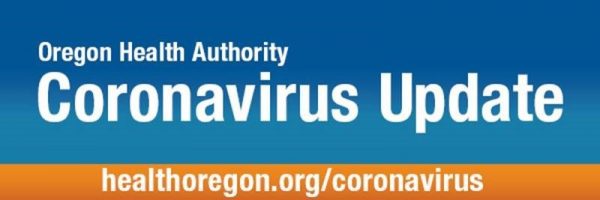COVID-19 has claimed 11 more lives in Oregon, raising the state’s death toll to 408, the Oregon Health Authority reported Wednesday August 19th.
OHA reported 203 new confirmed and presumptive cases of COVID-19, bringing the state total to 23,870.
The new cases are in the following counties: Baker (1), Clackamas (15), Columbia (3), Crook (1), Deschutes (4), Douglas (1), Hood River (1), Jackson (24), Jefferson (9), Josephine (2), Klamath (1), Lane (5), Linn (3), Malheur (10), Marion (30), Morrow (1), Multnomah (41), Polk (4), Tillamook (1),
Umatilla (11), Union (3), Washington (25) and Yamhill (7).
COVID cases continue downward trend
OHA issued its Weekly Report today, which showed during the week of Aug. 10 through Aug. 16, OHA recorded 1,963 new cases of COVID-19 infection — down from last week’s tally of 2,122. In addition, 31 deaths were reported, down from last week’s toll of 39. During that week the percentage of tests positive was stable at 5.4 percent, while new hospitalizations fell to 115 from 143 last week.
About two-thirds of cases reported contact with a confirmed case, most commonly from someone in their household. Outbreaks in care facilities and workplaces continue to be reported and investigated by local public health authorities. But a large number of new cases are “sporadic,” meaning that no source for the case was identified.
Talking to friends and family about wearing a face covering
Masks, face shields and face coverings are currently required statewide for offices and indoor public spaces, and outdoor public spaces when physical distancing is not possible. Many of us are adjusting to wearing face masks and feel good about helping to reduce the spread of COVID-19 with this strategy. However, some people close to you may not agree with this requirement or may doubt the importance of wearing a mask. Here are some things to consider when having a conversation with friends or family about wearing masks:
- Ask them to help you understand where they’re coming from. “No one really wants to wear a mask, but I can tell this really bothers you. Is there anything I can do to help?”
- Avoid shaming or scare tactics, such as sharing stories of outbreaks due to non-masking or criticizing people who don’t mask. This type of talk is more likely to shut down conversations and make people who don’t mask more inclined to hide their behaviors.
You can also share the facts. Oregon’s mask guidance website has facts about the effectiveness of masking to control the spread of COVID-19, the current state requirements for masking, and social media to share to bust common myths about face masks.
Don’t forget that some people with disabilities have difficulty wearing face coverings. You don’t need to intervene if you see someone without a face covering.
Thanks to everyone who is helping Oregon stay safe and healthy by wearing face coverings. You are making a difference in slowing the spread of COVID-19.

![]()
What to do if you have been exposed to COVID-19
If you have been exposed to someone with COVID-19, you need to quarantine for 14 days, even if you don’t have symptoms. This means:
- Staying at home or at the location provided by local public or tribal health.
- Staying at least 6 feet away from everyone you live with.
If you feel better after your 14 days of quarantine, you may resume your normal activities. If you start to feel sick, call your doctor for next steps.
To learn more, read OHA’s tips on how to quarantine. This graphic also explains more about what to expect if you’ve been exposed to someone with COVID-19.



